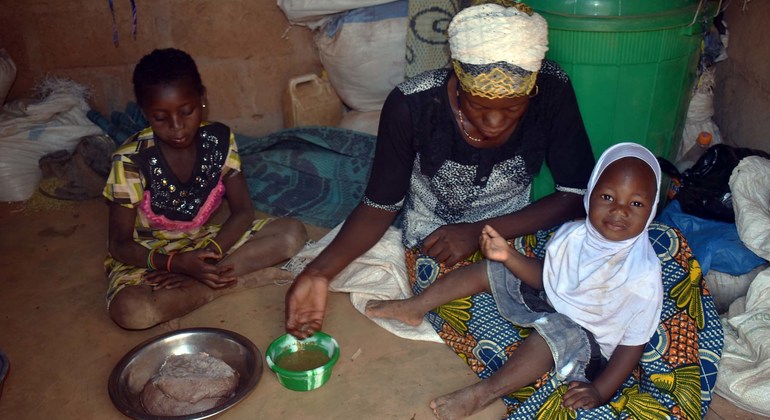
She noted the landlocked West African nation faced the on-going threat of violent extremism, climate change and humanitarian crises, but Michelle Bachelet also stressed that her fact-finding mission was “a testament” to the State’s openness the promotion and protection of human rights, in collaboration with the UN.
Armed Islamist groups have killed hundreds of civilians there, as well as in Mali and Niger, while Government security forces and pro-Government militias have also killed terrorism suspects and civilians.
Meanwhile, climate change is robbing farmers and herders of their livelihoods – sparking more conflicts and hindering access to water, food, healthcare and education.
“An already difficult humanitarian situation has become much more dire, with more than 3.5 million in need of humanitarian assistance – a 60 per cent increase since January last year. Of these, nearly three million are food insecure”, she explained.
‘Incredible resilience’
Ms. Bachelet discussed the country’s complex challenges with President Kaboré, senior ministers, as well as the President of the National Assembly and others.
“What I found was incredible resilience, dignity and integrity in the face of overwhelming hardship”, she said.
She described the plight of people forced to flee their homes, leaving behind lands and livelihoods, while host communities share what little they have with internally displaced people.
According to the Government, more than 1.4 million people have been displaced within Burkina Faso, as reports swirl of horrific violence and other human rights abuses, including allegations of summary executions, abductions and sexual violence.
“I stressed with President Kaboré, it is essential that all perpetrators of such human rights violations and abuses be brought to justice, regardless of their affiliation, and that they are held accountable for their actions”, said Ms. Bachelet, “in line with international standards”.
Comply with international laws
During her visit, she also underscored the need for all State security and affiliated forces to comply with international human rights law and international humanitarian law, as being “crucial to engender trust and confidence…and to guarantee that the State’s response to those who seek to destabilize it, is grounded firmly in the rule of law”.
“Not doing so will lead to failure in confronting violent and lawless extremism”, warned the High Commissioner.
She expressed serious concern over an increase in inter-communal tensions and urged political and community leaders to prevent communities from being targeted or vilified for perceived affiliation with violent extremism.
“Burkina Faso has a long tradition of ensuring peaceful coexistence of its people. Efforts need to be based on this as well as be rooted in human rights to avoid discrimination, ensure inclusion and address inequalities”, she stated.
Underrepresented voices
With some 59 per cent of the total population under age 20, she worried about the situation of youth, particularly in the north, where extremist violence is most prevalent.
“Poverty, the lack of access to economic opportunities and, in some cases, discrimination and marginalization can make young people more vulnerable to radicalization”, she said.
While acknowledging the frustration and impatience over deteriorating security in the country, she reminded that “it is more important than ever” to create space for dialogue to allow society to air grievances and jointly craft solutions.
Ms. Bachelet described as “key” the voices of youth, of women and of underrepresented minority communities and called on the State to “take proactive measures to increase the number of women in decision-making positions at all levels”.
“Solutions need to be found together – not imposed”, said the High Commissioner.

© UNHCR/Moussa Bougma
Internally displaced families living at a hosting site in Ouahigouya, Burkina Faso.
Decisive moment
Amid the crises, she hoped the international community would step up with greater support: “How it is managed can have repercussions for peace and security and human rights for millions of people in the country, in the region and beyond. International and regional support is and will continue to be vital”.
Now is a decisive moment that presents “a window of opportunity for robust action” grounded in human rights and the rule of law to “prevent the situation from spiralling out of control”, she argued.
Ms. Bachelet said her office (OHCHR) would now put in place a State-approved operation to provide technical assistance and training; conduct monitoring and reporting; and work with Government, civil society partners and UN agencies, to promote and protect human rights for all.
“This is part of the broader UN response to the crisis in the Sahel”, she added.